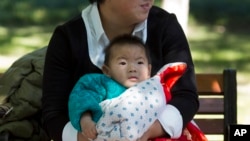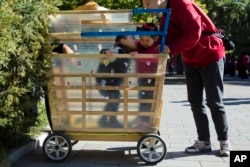Shares of companies that make diapers, baby strollers and infant formula got a boost Friday from China's decision to scrap its one-child policy. But for the maker of a popular brand of condoms, it was not the brightest of days.
Investors are betting on a bump in sales for companies with baby or child-related businesses after China's Communist leaders announced that all married couples would be allowed to have two children. The economic waves traveled as far afield as New Zealand, where the currency of the dairy exporting country surged.
Analysts at investment bank Credit Suisse estimated that the relaxed controls would result in an extra 3-6 million babies born annually in the five-year period starting in 2017. China, the world's most populous country with nearly 1.4 billion people, has about 16.5 million births each year.
Policy origin
The one-child policy began in 1979 to curb a surging population at a time when extreme poverty was widespread in China.
The Credit Suisse report said that with the annual cost of raising a child estimated at 40,000 yuan ($6,330), the extra births would translate into an extra 120-240 billion yuan ($19-38 billion) in consumer spending a year, or 4-6 percent of China's total retail sales.
One of the biggest winners in the financial markets was China Child Care Corp., which makes hair and skin care products for kids. Its shares ended 40 percent higher on Hong Kong's stock exchange.
Condom sales down
On the losing side, Japanese condom maker Okamoto Industries Inc., a favorite of Chinese visitors to Japan, slumped 10 percent in Tokyo.
Formula makers in Hong Kong and mainland China rose strongly, led by Beingmate Baby & Child Food Co., which jumped 10 percent on China's smaller Shenzhen stock exchange.
Japanese companies were also among the beneficiaries. Baby bottle maker Pigeon Corp. surged 10.7 percent while diaper makers Unicharm Corp. and Kao Corp. both rose nearly 4 percent in Tokyo.
Japanese and other foreign brands are popular with Chinese buyers because they're seen as being authentic and better quality. Those characteristics are prized in China following food and other product safety scandals involving domestic brands.
Some cautioned the increase in births may not be as big as predicted because of the expense of raising a second child and other factors.
“The rush for baby-related stocks may not necessarily bear fruit,” said IG analyst Bernard Aw in a report.
Financial boost
In New Zealand, the local dollar jumped as high as $0.6772, gaining nearly 1 percent from $0.6699 the day before. The country is a major dairy exporter and its milk powder and formula industry would likely benefit from a baby boomlet in China.
Some baby stocks started rising Thursday ahead of the official announcement on Chinese state media.
Goodbaby International, which makes strollers, car seats and cribs, rocketed 7.4 percent on Thursday and followed that up with a 2.3 percent gain Friday. Rumors had already been swirling in China that the policy would be adjusted at a meeting on China's next five year plan that was held this week.





